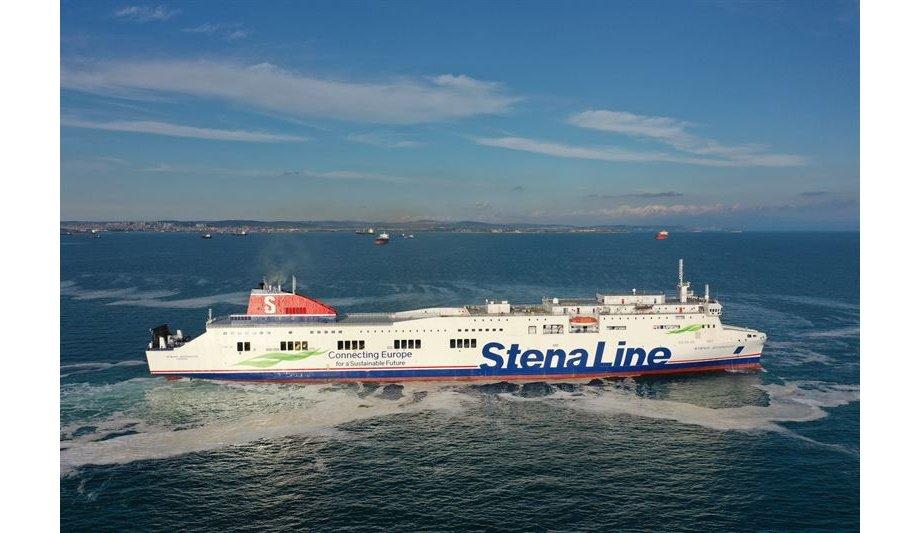Globally renowned Swedish ferry company - Stena Line has officially taken delivery of its newest RoPax ferry, Stena Scandica, on Friday, 18th June, 2021. The vessel is the first of two Visentini vessels that are being lengthened and modernised by Stena RoRo at the Sedef Shipbuilding in Tuzla, Turkey.
Stena Scandica will start operating on Stena Lines route between Nynäshamn in Sweden and Ventspils in Latvia in the beginning of July 2021.
Newest RoPax ferry, Stena Scandica
Stena Line is well underway in modernising its large European fleet of ferries
Stena Line is well underway in modernising its large European fleet of ferries and has not let the ongoing COVID-19 pandemic affect these ambitious plans. On Friday, 18th June, 2021, Stena Line officially took delivery of its newest RoPax ferry, Stena Scandica, following a handover ceremony at the Sedef Shipyard in Tuzla, Turkey.
Stena Line’s Chief Executive Officer (CEO) - Niclas Mårtensson said the delivery of Stena Scandica vessel is an important step in the company’s expansion in the Baltic Sea.
He said, “Taking delivery of the large, modern and efficient vessel - Stena Scandica is a major milestone for Stena Lineand and enables us to continue to grow together with our customers in the Baltic Sea. During the year, we will increase capacity with 30% on the Nynäshamn-Ventspils route, and 40% on the Liepaja-Travemünde route.”
A ground-breaking conversion
The ground-breaking conversion and lengthening of Stena Scandica (ex-Stena Lagan) and its sister vessel - Stena Baltica (ex-Stena Mersey) are managed by Stena RoRo at the Sedef Shipyard in Tuzla, Turkey.
The two vessels are lengthened with a 36 metre mid-section; after the conversion - they are 222 metres long and have a capacity of 970 passengers, 202 cabins and 2,875 freight lane meters. To increase the loading efficiency, the vessels are modified with drive through capabilities on two levels.
The interior and onboard facilities are updated to Stena Line’s familiar Scandinavian, light, and spacious design. The vessels are fitted with several sustainable features and fuel efficiency improvements, such as hybrid scrubbers, ballast water cleaning systems, twisted leading edge rudder with costa bulb.
Enlargement of the vessels capacity
Stena Scandica will now embark on a 10-day journey to her new home in the Baltic Sea
Per Westling, the Managing Director - Stena RoRo, said “This enlargement of the vessels capacity, as well as the new and unique efficiency measures included in the design, results in a significant reduction of the emissions for each lorry, as well as shorter turnaround time in the port, enabling a lower speed at sea. We are pleased that this complex conversion has been possible to perform despite the challenges caused by the COVID-19 pandemic.”
Stena Scandica will now embark on a 10-day journey to her new home in the Baltic Sea, where she will begin service in the beginning of July on the route between Ventspils in Latvia and Nynäshamn in Sweden.
Later this year, its sister vessel - Stena Baltica will join Stena Scandica, and with both vessels in place, the total capacity increase on the route is 30%.
Stena Scandica – Ship Facts
- Route: Nynäshamn-Ventspils from July 2021
- Name: Stena Scandica
- Built: 2005 at the Italian shipyard Cantiere Navale Visentini
- Modified/Lengthened: by Stena RoRo during 2020/2021 at the Sedef Shipyard in Tuzla, Turkey.
- Length: 222 metres
- Passenger capacity: 970
- Freight capacity: 2,875 lane metres + car deck
- Cabin capacity: 202
Adding 40% capacity on the Travemünde-Liepaja route
As part of the ongoing expansion in the Baltic Sea, Stena Line will relocate the two vessels currently sailing on Nynäshamn-Ventspils, Stena Livia and Stena Flavia, to the route between Liepaja in Latvia to Travemünde in Germany. The vessels will increase the freight capacity on the route by 40% and shorten the crossing time from 27 to 20 hours.
This will enable a reliable transport service with a fixed timetable with 12 weekly departures, six in each direction. The new vessels will also offer improved onboard facilities and increase the number of cabins, making the route an attractive choice for transport and travel between the Baltic countries and Germany.



